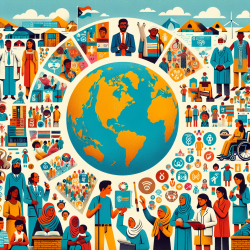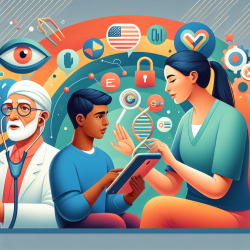The quest for Universal Health Coverage (UHC) is a central tenet of the United Nations' Sustainable Development Goals (SDGs), specifically Goal 3, which aims to "ensure healthy lives and promote well-being for all at all ages." As practitioners in the field of health and education, understanding the intersection between UHC and human rights can significantly enhance our ability to provide equitable services.
Understanding the UHC Target in the SDGs
The UHC target in the SDGs is designed to provide financial risk protection, access to quality essential health-care services, and access to safe, effective, quality, and affordable essential medicines and vaccines for all. However, the research article "Assessing the universal health coverage target in the Sustainable Development Goals from a human rights perspective" highlights several gaps that must be addressed to fully realize these goals.
Key Insights from the Research
- Human Rights Overlaps: While UHC aligns with human rights standards, it lacks explicit commitments to prioritize disadvantaged communities.
- Monitoring Shortcomings: The current monitoring framework does not adequately disaggregate data to highlight inequalities among different groups.
- Financial Protection: The approach to financial risk protection needs refinement to prevent impoverishment due to health expenses.
Implementing Human Rights Principles in UHC
For practitioners looking to improve their skills and impact, integrating human rights principles into UHC initiatives is crucial. Here are some actionable strategies:
- Prioritize Disadvantaged Communities: Ensure that health services are accessible to poor and marginalized groups by implementing targeted measures. This involves designing health plans that focus on primary and preventive care rather than expensive tertiary services.
- Enhance Monitoring Systems: Develop monitoring frameworks that use disaggregated data to identify which communities are being left behind. This will help tailor interventions more effectively.
- Financial Risk Protection: Advocate for policies that reduce out-of-pocket expenses for health services, especially for primary care. This could involve eliminating user fees or providing subsidies for low-income households.
The Role of Practitioners in Advancing UHC
Practitioners play a pivotal role in bridging the gap between policy and practice. By adopting a human rights-based approach, they can ensure that no one is left behind in the pursuit of universal health coverage. Networking with other professionals and staying informed through conferences and publications can provide valuable insights into best practices and innovative solutions.
Moreover, practitioners can collaborate with policymakers to advocate for necessary changes in health systems that align with human rights standards. This collaboration can lead to more inclusive policies that address the needs of all community members, particularly those who are most vulnerable.
Encouraging Further Research
The journey toward achieving UHC is ongoing, and continuous research is essential for identifying new challenges and opportunities. Practitioners are encouraged to engage with academic institutions and research organizations to contribute to this body of knowledge. By doing so, they can help shape policies that reflect both global standards and local realities.
If you are interested in exploring this topic further, consider reading the original research paper: Assessing the universal health coverage target in the Sustainable Development Goals from a human rights perspective.










